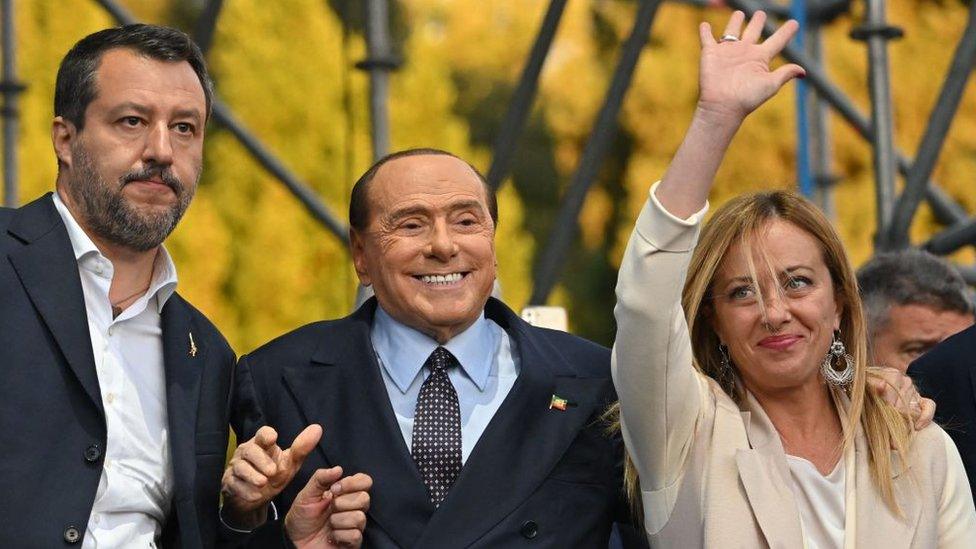Giorgia Meloni: Italy's new leader arrives at a critical time for Europe
- Published
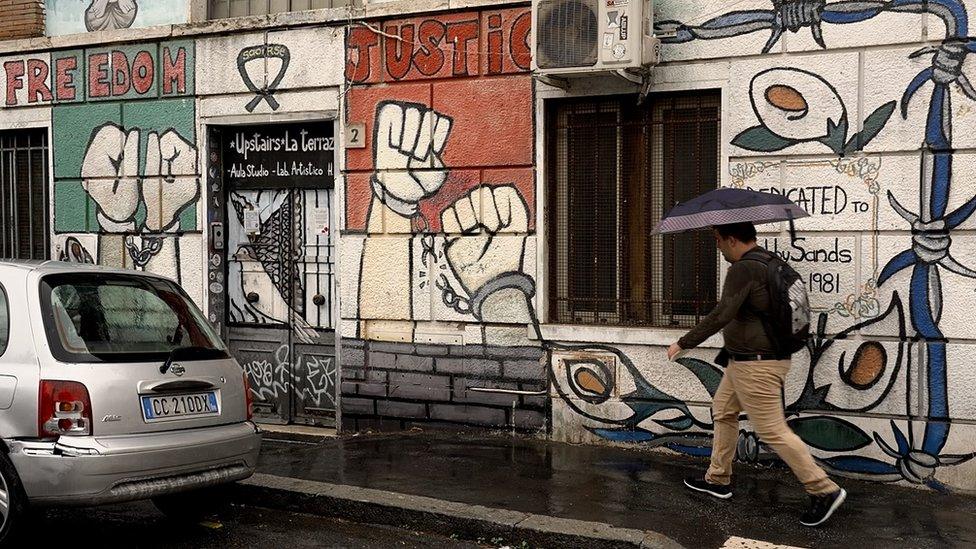
From political wilderness to pole position to become Italy's first female prime minister, this is the moment Giorgia Meloni has been waiting for all her political life, since she first started as a far-right teen activist in a working class district of Rome.
A hard grafter and canny politician, she presented two faces on the campaign trail this election.
Her signature hard-edged, firebrand tones on the one hand, and a more measured, conservative persona, on the other. She hoped that would attract a more mainstream vote. The gamble paid off. She's headed for Palazzo Chigi - the prime minister's residence. A veritable dream come true.
But not for everyone. Millions of Italians didn't vote for her. They say they don't recognise themselves in her nationalist, protectionist proposals, her anti-immigration rhetoric and conservative family mores.
For the EU, it's a nightmare scenario.
Giorgia Meloni's ardent nationalism really worries Brussels. Italy is the bloc's third largest economy and one of its founding members. Ms Meloni is a deep Eurosceptic at heart. On the campaign trail she often spoke of Italy being downtrodden by the EU's bigger and more wealthy members. And while she's steered clear of calling for Italy to leave the euro or the European Union altogether, she is thought likely to team up with members seen by Brussels as "problematic" - Hungary and Poland - particularly when it comes to migration.
"Brussels shouldn't panic, though," Nicoletta Pirozzi of the International Relations Institute in Rome told me. She describes Ms Meloni as a political pragmatist, who's clocked the importance of EU money, especially the eagerly anticipated Covid-19 funds, designed to help boost member states' economies after the pandemic.
But fiscal discipline could certainly be a flashpoint with Brussels. Italy is one of Europe's most indebted nations, yet Giorgia Meloni's welfare promises are considerable. They include more support for disabled people, for childcare, for pensioners and for Italian women. Her attempt, she says, is to encourage them to have more babies and to keep the number of immigrant workers in Italy down.
Those promises add up to a lot of money. As does her business-friendly pledge of a flat tax. Realistic or not, on paper it would mean less government income to play with - and a lot of pressure to borrow more.
Giorgia Meloni claims victory in Italy's general election
Giorgia Meloni's election victory comes at a critical time for Europe, with war back on the continent. Sanctions against Russia are driving up inflationary pressures. And Ms Meloni knows Italians' main concerns are an acute cost of living crisis and spiralling energy costs. Italy has been particularly hard hit as it used to rely so much on Russia for gas.
Nato allies worry that mounting Italian public pressure over what's expected to be a tough winter, could persuade Giorgia Meloni to pull back from sanctions and a hard line against Moscow over its invasion of Ukraine. To add to the complexities here, her chosen coalition partners to govern - tycoon Silvio Berlusconi and anti-immigration populist Matteo Salvini have historic ties to Vladmir Putin. Ms Meloni, on the other hand, likes to think of herself as an Atlanticist - someone who aligns their support with Western Europe and the US.
When we visited Garbatella, the graffiti-adorned, rough-around-the-edges Rome neighbourhood where she grew up and got into politics, clients at a local café were reluctant to say whether they'd voted for their former neighbour. But everyone we spoke to hoped she'd honour her pledge to reverse Italy's spluttering fortunes.
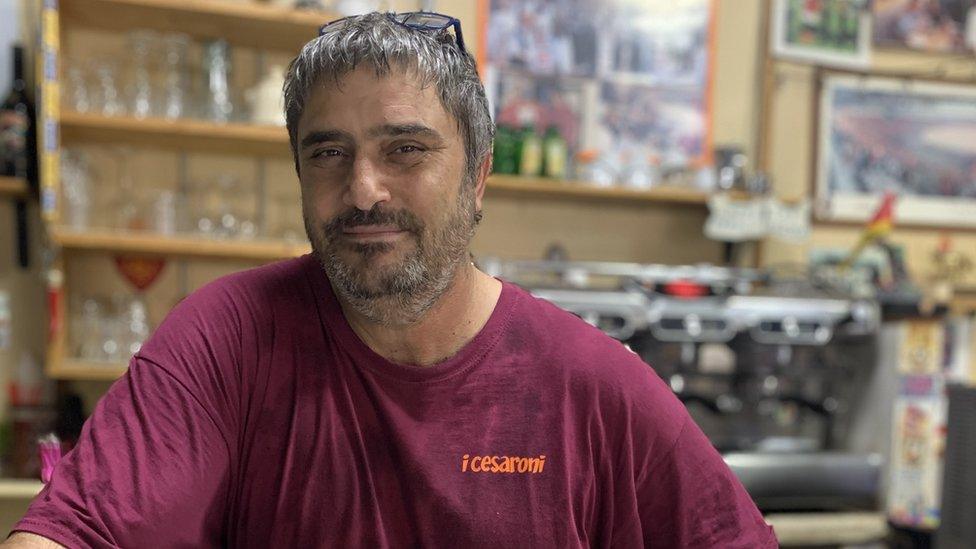
"Neighbourhood boy" Alessandro Cesaroni
Larger than life barista, Alessandro Cesaroni, told me he and "La Meloni" were the same age (45), though they'd never met. Clearly, he laughed, they'd taken very different paths in life. "Me, I'm a neighbourhood boy, while she's taking the top job in politics!"
He was impressed, he said, with her political style.
"Meloni comes to town squares, to little places like this. She knows how to talk to ordinary working people. Not preaching like others from a pulpit. We can only hope she'll keep her promise to get Italy back on its feet."
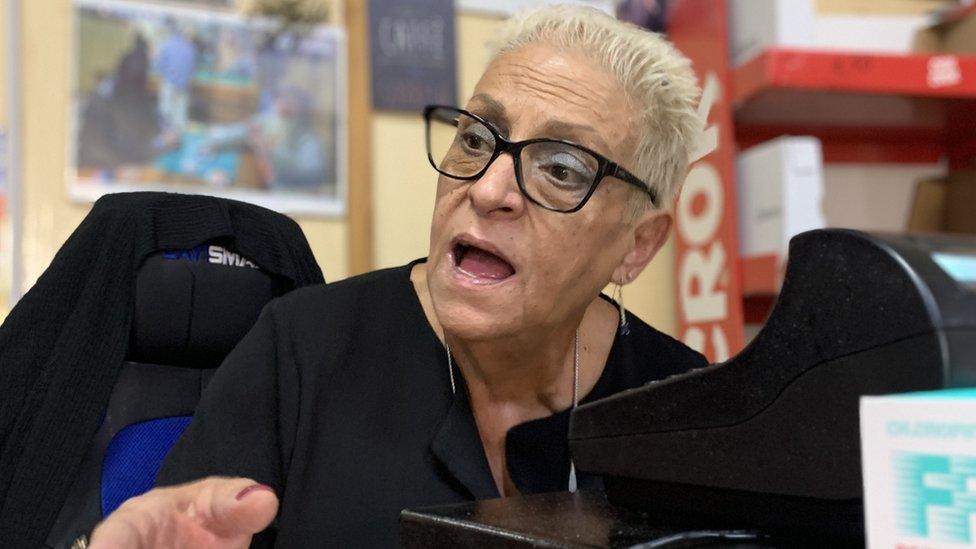
Behind the till, Alessandro's chain-smoking mum Paula nods enthusiastically
The EU also has its (metaphorical) fingers crossed. That a right-wing nationalist front isn't building in Europe.
Giorgia Meloni's will be the most right-leaning Italian government since World War Two. And Italy's election comes hot on the heels of a vote in Sweden, which saw the Sweden Democrats - with its roots in Neo-Nazism - become the country's second largest party.
This summer, Marine Le Pen's far right National Rally performed spectacularly in France's parliamentary election. And, as alluded to above, the EU is already struggling with what it calls "rule of law issues" with the nationalist governments in Poland and Hungary.
One battle that EU enthusiasts seem to have lost already is the dream of an ever-closer political union among member states. Few EU countries would sign up to that these days, whatever the political flavour of their government.
Whether it's France's Macron, Germany's Scholz or the Netherlands' Mark Rutte, the prevailing attitude among most can be summed up as: let's band together when its mutually beneficial, like vaccine-buying during the pandemic, but forget pooling too much of our sovereignty, thank you.
And in that sense, Giorgia Meloni will fit right in.

More on Italy's election
Meloni: Leader on course to lead Italy
Who's who? What you need to know in Italy's election
Katya Adler: Italy's far right cash in on cost of living crisis

Related topics
- Published26 September 2022
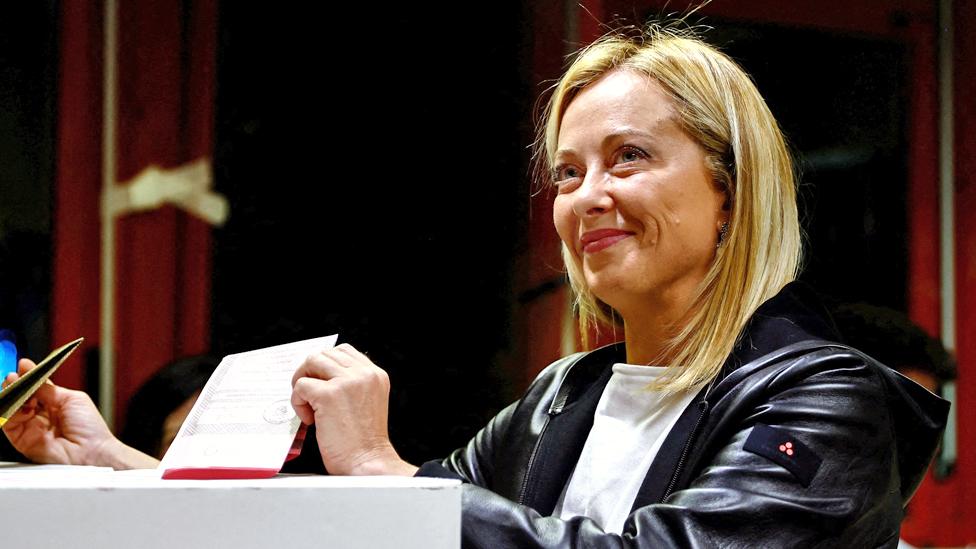
- Published22 September 2022
